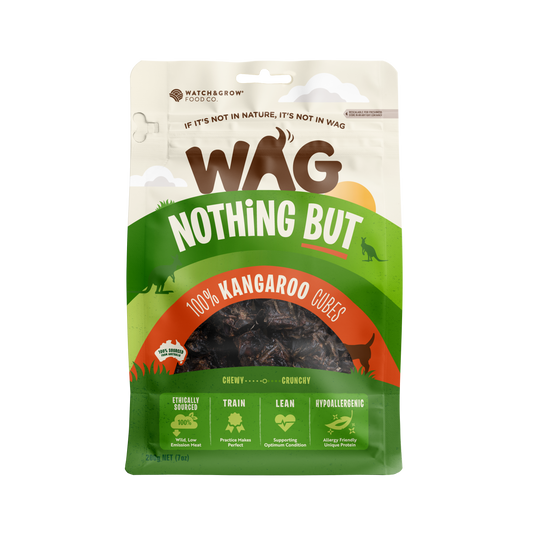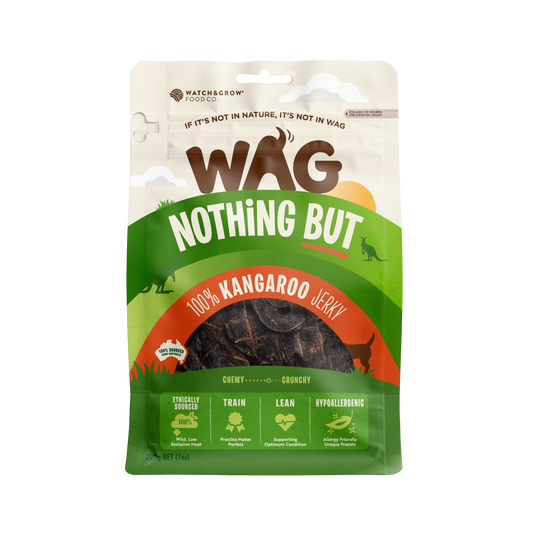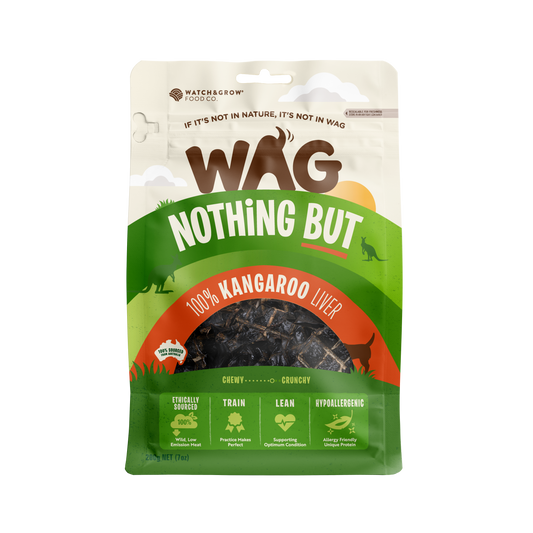Allergies suck — and not just for your dog. One minute they’re living their best life. The next? Itchy skin, sore bellies, and a heap of ear scratches.
Food allergies can show up in all sorts of ways, and spotting them early means your doggo doesn’t have to be uncomfortable for longer than they need to.
If you’re wondering what foods are hypoallergenic for dogs, we’ve got you covered — and we’ve got the treats to prove it.
First off, what’s a dog food allergy?
Food allergies happen when your dog’s immune system gets its wires crossed and flags a totally normal food as a threat. Proteins like beef, chicken, or lamb — the kind found in lots of commercial dog foods — can become troublemakers for sensitive pups.
Once their system recognises it as an allergen, it sends out antibodies to fight it off. That immune response? That’s what causes all the scratchy, red, and sometimes tummy-troubling symptoms you’re seeing.

What are the symptoms of allergies in dogs?
Allergy symptoms in dogs aren’t always straightforward. While sneezing might be your go-to, for dogs it usually shows up like this:
- Itchy, red or irritated skin
- Excessive licking or biting
- Vomiting or diarrhoea
- Hot spots or scabs
- Hair loss
- Recurring ear infections
- Sensitive stomachs
Not all allergy symptoms are caused by food, but if you’re seeing gut issues and skin irritation, there’s a fair chance their food could be the culprit.
The best move in this scenario? Talk to your vet and consider an elimination diet to track things down.

Can dogs suddenly become allergic to their food?
Yep. It’s weird, but true. A protein your dog’s eaten for years (like chicken or beef) can suddenly start causing reactions. This happens because of repeat exposure — the more often they eat it, the more likely their immune system is to develop a sensitivity.
It’s also why the most common protein allergies are from the most common meats. Your dog’s had them over and over, and eventually their body might say, ‘No thanks!’.
So, what foods are hypoallergenic for dogs?
When we talk hypoallergenic, we’re really talking about proteins that are less likely to cause a reaction, either because they’re novel (your dog hasn’t eaten them before), or because they’re naturally low in allergens.
What you feed your dog has a huge impact. Here are a few of the best protein sources for sensitive pups:
Kangaroo: the MVP for food allergies
We love kangaroo here at WAG, and for good reason. It’s a lean, novel protein that most dogs haven’t had much exposure to. Less exposure means a lower chance of an allergy.
It’s also high in iron, low in fat, and considered a ‘cooling’ meat by some vets. That means it might help calm inflammation in the body (which is especially handy if your dog’s already irritated).
Our favourite kangaroo treats:
- Kangaroo Tendons – chewy, long-lasting and great for dental health
- Kangaroo Jerky – pure single protein, no fillers
- Kangaroo Cubes – bite-sized bits perfect for training or trialling
Just make sure it’s 100% roo. No grains, no filler stuff, no hidden nasties. WAG treats are the real deal — single ingredient and air-dried to lock in the good stuff.

Venison: a lean, low-reactive red meat
Venison is another fantastic option for dogs with sensitivities. It’s not often found in mainstream pet food, which makes it a great novel protein to try during an elimination diet.
Bonus: it’s iron-rich and easy to digest.
Try: Whole Antlers or Split Antlers
Goat: gentle and rare
Goat isn’t just delicious, it’s also naturally lean and packed with nutrients. Because it’s not commonly used in commercial foods, it’s an ideal pick for allergy-prone pups.
Try our Goat Horns – a long-lasting chew that supports dental health and keeps your dog busy. No additives, no problems.

Fish: tasty, with a side of omega-3
Fish ticks all the boxes: it’s high in Omega-3s (hello, healthy skin and shiny coats) and naturally anti-inflammatory. If your dog’s dealing with allergies and skin issues, fish could be the win-win you need.
Try: Forage Fish – whole, air-dried wild Hardyhead Aussie fish packed with essential omega-3 fatty acids. Crunchy, healthy, and 100% real.

Managing your doggo’s food allergies at home
Figuring out what works takes a bit of trial, error, and patience. Here’s how to keep things on track:
- One protein at a time. Don’t mix and match during an elimination diet. Stick to one novel protein and see how your doggo goes.
- Stick to single-ingredient treats. That way, you always know what your dog’s eating.
- Read every label. If there’s more than one ingredient or something you can’t pronounce, steer clear.
- Work with your vet. Always your best first call for allergy issues.
Why WAG works for allergy-prone dogs
We get it, shopping for dog treats for dogs with allergies is stressful. That’s why we keep our treats simple.
- 100% single-ingredient
- Ethically sourced in Australia
- No grains, fillers, or additives
- Air-dried to lock in nutrition
- Loved by vets, trainers and allergy-prone dogs alike
Our treats help you ditch the guesswork. You know exactly what your dog is getting, and more importantly — what they’re not.

Less itch, more wag
Having an allergic dog doesn’t mean giving up on treats. With the right protein and a little help from WAG, your dog can enjoy snack time without the scratching, itching, or tummy trouble.
So if you’re searching for what foods are hypoallergenic for dogs, here’s your shortlist: kangaroo, venison, goat, and fish. All available in our single-ingredient range, made right here in Australia.
Give your doggo the treat they deserve — no nasties, no stress. Just a wagging tail and a happy belly.
Shop the Recipe
WAG Team
Up Next
Adding fish into your dog's diet







